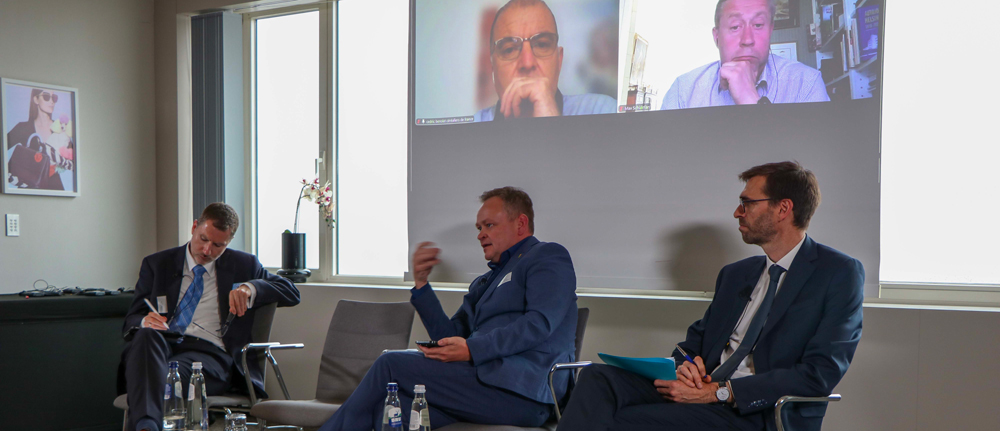2024 Rebuilding Ukraine’s Agriculture – Panel 3: EU framework and Ukrainian agriculture
Event summary
Friday, Jul 12, 2024
Panel 3: EU framework and Ukrainian agriculture
The third panel session of the mini-conference examined how Ukraine and the EU can work together and what framework is needed, as Ukraine goes through the accession process.
From the EU side, the process ahead is very clear as it is based on previous enlargement – but for all that, the EU will take the time and do what is needed to support Ukraine on the journey. This was the reassurance given by Vincent Cordonnier, Deputy Head of Unit, Neighbourhood enlargement and pre-accession assistance DG AGRI, European Commission, as he outlined the fundamentals of accession.
First step is a negotiating framework, followed by an inter-governmental conference with Ukraine and Moldova. Next comes a screening process in which the EU presents its legislation and Ukraine demonstrates where it is already aligned. There will be a report by the European Commission, and negotiations on each of six clusters comprising 35 chapters, of which agriculture is one. Ultimately, current member states will need to make a unanimous decision.
“There are some fundamental principles,” said Mr Cordonnier. “The enlargement process in merit-based and reversible so, until everything is agreed, nothing is agreed. Both EU and Ukraine need to be ready, meaning Ukraine has to integrate the EU hierarchy.” The country has to increase competitiveness of the agricultural sector, enhance administrative capabilities, and align legislation. But there is no rush to present plans for the CAP.
“Ukraine has done the first step, which is to develop a strategy for the sector, their role, and rural development. It will not be easy, and it will take time, but Ukraine is already close to the EU, and we have instruments to support candidate countries.” He called out “dramatic figures” that he had seen and heard being given for the supposed budgetary impact of Ukraine’s accession, and cautioned that the country joining would not be a threat to other member states. “There’s no need to dramatize; in the past, and in the future, appropriate arrangements will be considered to alleviate the budgetary impact. Let’s trust the process.” It is a major advantage for Europe to become a bigger global player, and a wider geographical area will help compensate for the effects of climate-related crop losses in one part of the bloc.
How will Ukraine approach meeting the requirements? Andrii Dykun, Chairman, Ukrainian Agri Council said that the first priority is to end the war, which requires constraining Russia’s ability to produce and export food. Today, machinery, equipment, seeds and genetics are flowing from EU countries to Russia. “Without this, they would not be able to export. We will join, we will adjust, we will find synergies,” he said. “But number one, we need to stop the war.”
During alignment, Mr Dykun said, it was important not to destroy Ukraine’s existing productive agricultural systems because they currently generate substantial revenue, some of which funds defence. The country also needs to be able to export to Africa, Asia and China as it did before the war. Turning to Ukraine’s farms, he said there needed to be a focus on small and mid-sized farms and well as large ones, as these make a significant contribution to overall agricultural output.
The best approach is to see what Ukraine and Europe can do together as a bloc, said Max Schulman, Senior Advisor, cereals oilseeds at Central Union of Agricultural Producers and Forest Owners (MTK), Finland. “What is the potential together? I would say we need to look at it as 5 plus 5 plus 5 – a 15-year perspective on what we could do in each of those phases and what would have to be adjusted. Once Ukraine is part of Europe, we are one of the biggest exporters. We could become a price-setter instead of a price-taker. I would look at it not as a glass half empty, but as a glass that might become nicely full.”
One challenge raised was for the EU to better understand Ukraine and its agriculture, especially technical points such as the spread of different sized farms mentioned previously. With that and many other challenges ahead, Mark Titterington invited the panellists to look one year ahead and say what is the most important thing to be done in that timescale.
The consensus was to meet more often for discussions and interactions, and knowledge exchange between Ukrainian experts and DG AGRI. For Cédric Benoist, Deputy Secretary General, AGPB (France), it was where the discussion started: “victory in the war”.
Read the summaries of the other sessions at this event:
Welcome, introduction and panel 1
Panel 2: Global market access for Ukrainian agriculture
Watch the full sessions on our videos page and you can read the CEMA position paper.


